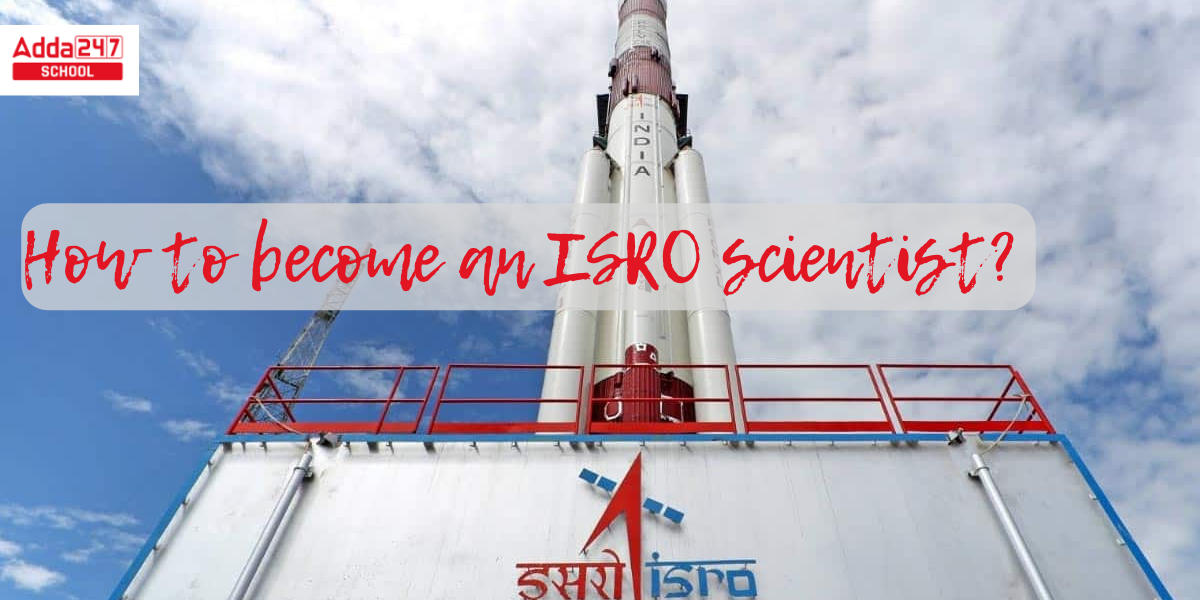Table of Contents
How to become an ISRO scientist? For a space enthusiast, being a space scientist is like realizing a lifelong ambition. And it’s a cherry on top if you become an ISRO Scientist and work for one of the greatest space agencies in history, ISRO. ISRO, or the Indian Space Research Organisation, is one of the world’s largest space agencies, known for its cost-effective programmes and cutting-edge technology. On August 23, India’s ISRO became the fourth country to succeed in landing on the moon. The soft landing of the Chandrayaan-3 mission near the moon’s south pole was a first in lunar exploration. ISRO’s achievements inspire India’s young to join ISRO as space scientists or other technicians.
How to become an ISRO scientist?
How to Join ISRO? Indian Space Research Organization is comprised of numerous organizations. It offers a diverse range of challenging career options, ranging from the development of breakthrough technologies to the sophisticated facilities required for space exploration. Students appear to be usually fascinated by the process of joining ISRO. After the 12th, interested individuals have 3 alternatives for joining ISRO as a scientist. IITs and NITs hire engineers via campus recruitment every year. Acceptance into the Indian Institute of Space Science and Technology (IIST) may be the quickest path to employment as a scientist or engineer. On the other hand, after obtaining your engineering degree in the relevant branch, you can take the ICRB exam to become an ISRO scientist.
Why is becoming a scientist in ISRO so prestigious?
On August 15, 1969, the Indian Space Research Organisation was established, with its headquarters in Bengaluru. Due to ISRO’s recent accomplishment in the Moon mission, many young students see themselves as future ISRO scientists and want to join the Indian Space Agency. ISRO has produced various significant achievements that we can be proud of and outperformed in its sector over the years, and we have mentioned a few of them here.
- On November 21, 1963, TERLS (Thumba Equatorial Rocket Launching Station) launched the first sounding rocket.
- ISRO launched India’s first satellite, Aryabhata, named after the first of India’s great astronomers from the Baikonur Cosmodrome spaceport in 1975, using a Russian-made rocket.
- On August 10, 1979, the first experimental launch of SLV-3 with Rohini Technology Payload aboard occurred.
- The second satellite in the INSAT 2 series is to be launched successfully for telecommunications and meteorological monitoring.It launched on July 23, 1993.
- Chandrayaan 1 was India’s first lunar probe, flown on October 22, 2008, from the Satish Dhawan Space Centre in Sriharikota, Andhra Pradesh, using a PSLV-XL C11 rocket.
- PSLV-C37 launched 104 satellites in a single operation from Andhra Pradesh’s Sriharikota on February 15, 2017.
- ISRO successfully completed the Chandrayaan-3 mission for a low cost of $75 million, capturing global attention.
- ISRO launched Aditya-L1, a space-based solar observatory mission, on September 2nd.
Who is a space scientist?
Space science is the study of the universe by scientists. The Narendra Modi government’s new stance on space technology has created numerous chances for private enterprises as well as ISRO. The number of space scientists in India has more than fivefold increased. To become an ISRO space scientist, you must first complete an engineering or science programme.
ISRO often seeks experts with a master’s degree in mechanical, electrical, or computer engineering, as well as a Ph.D. in Astronomy, Physics, or Mathematics. There are two types of space scientists in this field of study: physicists and astronomers. Physicists concentrate on theoretical aspects of the field as well as laboratory equipment. They are in charge of how things work in space, whereas astronomers study stars, planets, galaxies, and so on. Whatever path you take, all roads ultimately lead to a career in space science.
What are the eligibility criteria needed to join ISRO as a Scientist?
Appropriate education in pure science or engineering areas is required to become a space scientist. ISRO seeks PhD candidates in Astronomy, Physics, and Mathematics, as well as engineers with backgrounds in mechanical, electrical, electronics, and computer science. ISRO generally recruits candidates with solid knowledge and requisite skills in the domains of astronomy, physics, and mathematics, either directly or through the CRB examination. Let us explore what specializations are required to enter ISRO.
- How to Join ISRO after the 12th?
To begin with, students must have MPC subjects (Mathematics, Physics, and Chemistry) throughout their 10+2 secondary-level schooling. Students should have a strong aptitude for mathematics as well as the physical concepts that have been introduced to them. Details are discussed in the next part. - How to join ISRO after engineering?
Students should enroll in one of the several engineering branches available through JEE Advanced and JEE Mains after graduating from high school with an extraordinary CGPA or percentage (above 75%). Despite the fact that the list of best engineering courses is lengthy, students must pursue BTech or BE degrees in fields such as Mechanical Engineering, Aerospace Engineering, Computer Science Engineering, Electronics Engineering, Electrical Engineering, Engineering Physics, Radio Engineering, and others.
- How to join ISRO after completing the ICRB entrance exam after engineering?
ISRO prefers to employ fresh graduates from India’s best engineering schools, such as IISc, IITs, NIT, IIST, and other highly regarded government and commercial institutions. After completing the BTech/BE degree, the next phase in becoming an ISRO scientist is to take the ISRO Centralised Recruitment Board (ICRB) exam. A benefit of taking an engineering degree at IIST is that students with outstanding academic records can expect to be accepted into the organization. An applicant must have a BTech or BE degree in Computer Science, Electronics, Mechanical, or any other relevant discipline with a minimum aggregate of 65% marks or 6.8 CGPA on a scale of 10. After passing the exam, those who were selected must pass a written test and an interview round in order to join the organization.
- How to join ISRO after completing MTech?
Some of the top MTech courses upon completion of the degree programme include geophysics, geoinformatics, instrumentation, applied mathematics, and so on. The selection process for those who apply straight to the ISRO comprises a written test and an interview. After passing this, the candidates would be able to work as scientists at ISRO. - How to join ISRO after completing the postgraduate degree?
A different path to becoming an ISRO scientist is for people who have finished their Masters (MSc, ME, or MTech) and Ph.D. in relevant specializations. - How Can I join ISRO as a Scientist?One can apply to work at ISRO as a junior research fellow, which allows them to undertake research as scientists and engineers. The recruitment process for a Scientist in such an enterprise is quite demanding, requiring the greatest degree of intelligence, wit, and a very appealing and calm manner.
How to join ISRO after the 12th?
Step 1 – If you want to become a Scientist in ISRO after graduating from high school, you must first gain admission to one of India’s premier universities, the Indian Institute of Space Science and Technology (IIST). This is one of the best ways to work as a scientist for ISRO. ISRO is only open to those who have completed their BE/BTech with a first-class degree and a minimum aggregate of 65% or a CGPA of 6.84.
Step 2 –Here is one of the three tests you can take to get into ISRO after graduating from high school: IISER administers the JEE Advanced Kishore Vaigyanik Protsahan Yojana State and Central Board Aptitude Test.
Courses to become an ISRO scientist
ISRO (Indian Space Research Organisation) is one of the most powerful and successful space agencies in the history of mankind. Many scientific students are curious about “how to become a scientist in ISRO after 12th or doing any course” and want to work for the Indian space agency because it offers fascinating and demanding chances. To become an ISRO Scientist, candidates need to follow one of the courses listed below.
- B.Tech in Avionics Engineering
- B.Tech+M.S./M.Tech
- B.Tech in Aerospace Engineering
- Bachelor’s in Physics (BSc Physics)
- Masters in Physics (MSc Physics)
- Ph.D. in Aerospace Engineering
- Ph.D. in Physics
- B.Tech. in Engineering Physics + M.S. in Solid State Physics, Earth System Science/ M.Tech in Optical Engineering, Astronomy.
- Masters in Astronomy (MSc Astronomy)
- Ph.D. in Astronomy
- B.Tech + M.Tech in Engineering (Mechanical, Electrical, CS)
How to get a Job in ISRO?
To be eligible, you must have taken a science, maths or physics subject in high school and be familiar with the fundamentals of each (a 75% or higher is preferred). Students can apply for jobs at ISRO in a variety of methods.
- Getting a place at the Indian Institute of Space Technology (IIST) is the quickest route to join the ISRO. ISRO actively invites IIST students as scientists each year based on their requirements. You must, however, maintain a CGPA of 7.5.
- Every year, IISc, IITs, and NITs generate high-caliber graduates who are directly recruited by ISRO. B.Tech students in Engineering Physics, Electronics and Communications, aerospace engineering, and Mechanical Engineering are more likely to consider such positions.
- ISRO conducts the ICRB (ISRO Centralised Recruitment Board Exam) exam once a year. You can take this test after finishing a BE, BTech, BSc(Engg), or a Diploma + BE/BTech (lateral entry). However, only computer, mechanical, and electrical students are qualified to take the exam.
- Aside from these, ISRO recruits personnel by holding a generic competitive exam for graduates of any discipline.
How to become an ISRO after Computer Engineering?
To get a job with ISRO after graduating from computer engineering, you must go through the following steps:
- Students must have at least a 65% average in their BTech/BE programme.
- They should be under the age of 35.
- To join the team, you must take the ISRO Centralised Recruitment Board’s test, which consists of a written test and an interview.
Top Colleges for Space Science in India
We’ve also produced an additional list of the top and finest space science colleges/institutes in India to help you decide where to study to join ISRO in the future.
- Indian Institute of Science, Bangalore
- Indian Institute of Technology, Bombay
- Indian Institute of Space Science and Technology, Thiruvananthapuram
- Indian Institute of Technology, Kharagpur
- Indian Institute of Technology, Kanpur
- Indian Institute of Astrophysics, Bangalore
- Indian Institute of Technology, Madras
- National Centre for Radio Astronomy, Pune
- Inter-University Centre for Astronomy and Astrophysics, Pune
- Aryabhatta Research Institute of Observational Sciences, Nainital
- Indian Institute of Space Science and Technology, Kerala
- Physical Research Laboratory, Ahmedabad
- Centre for Earth and Space Sciences, (University of Hyderabad)
- Raman Research Institute, Bangalore
- Radio Astronomy Center, Ooty
- Hindustan Institute of Technology and Science
- Manipal Institute of Technology
- International Institute for Aerospace Engineering and Management, Jain University Bangalore
- Birla Institute of Technology, Mesra
- Madras Institute of Technology, Chennai
Salary and Incentives for ISRO Scientists
Many students are unaware of how to become scientists at ISRO after 12th grade, so we will address this question in this part. ISRO scientists earn wages and benefits ranging from Rs. 56100 to Rs. 177500 per month. Job security is one of the benefits of working with ISRO. You will be employed for an extended period of time, your work will be secure, and employees will be entitled to a pension once they retire. There are various more allowances and benefits offered to service members, including:
- Allowances for travel
- Dearness allowance
- Housing benefits
- Medical services
- Vehicles provided by the government
- After retirement, pension



 JEE Mains Result 2025 Session 2 Live: Sc...
JEE Mains Result 2025 Session 2 Live: Sc...
 UP, MP, CBSE Board Result 2025 Live Upda...
UP, MP, CBSE Board Result 2025 Live Upda...
 [Live] CUET UG Date Sheet 2025 @cuet.nta...
[Live] CUET UG Date Sheet 2025 @cuet.nta...










